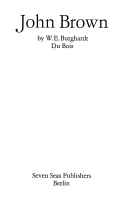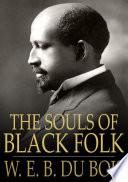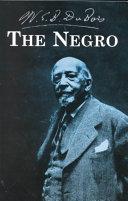Works

John Brown
W.E.B. Du BoisDusk of Dawn
W.E.B. Du BoisFamous W.E.B. Du Bois Quotes
Source: Writings: The Suppression of the African Slave-Trade / The Souls of Black Folk / Dusk of Dawn / Essays
Source: Black Reconstruction in America (1935), p. 727
Context: The most magnificent drama in the last thousand years of human history is the transportation of ten million human beings out of the dark beauty of their mother continent into the new-found Eldorado of the West. They descended into Hell; and in the third century they arose from the dead, in the finest effort to achieve democracy for the working millions which this world had ever seen. It was a tragedy that beggared the Greek; it was an upheaval of humanity like the Reformation and the French Revolution. Yet we are blind and led by the blind. We discern in it no part of our labor movement; no part of our industrial triumph; no part of our religious experience. Before the dumb eyes of ten generations of ten million children, it is made mockery of and spit upon; a degradation of the eternal mother; a sneer at human effort; with aspiration and art deliberately and elaborately distorted. And why? Because in a day when the human mind aspired to a science of human action, a history and psychology of the mighty effort of the mightiest century, we fell under the leadership of those who would compromise with truth in the past in order to make peace in the present and guide policy in the future.
Source: The Souls of Black Folk (1903), Ch. I: Of Our Spiritual Strivings
Context: After the Egyptian and Indian, the Greek and Roman, the Teuton and Mongolian, the Negro is a sort of seventh son, born with a veil, and gifted with second-sight in this American world, — a world which yields him no true self-consciousness, but only lets him see himself through the revelation of the other world. It is a peculiar sensation, this double-consciousness, this sense of always looking at one's self through the eyes of others, of measuring one's soul by the tape of a world that looks on in amused contempt and pity. One ever feels his twoness, — an American, a Negro; two warring souls, two thoughts, two unreconciled strivings; two warring ideals in one dark body, whose dogged strength alone keeps it from being torn asunder.The history of the American Negro is the history of this strife, — this longing to attain self-conscious manhood, to merge his double self into a better and truer self.
W.E.B. Du Bois Quotes about men
Source: The Souls of Black Folk (1903), Ch. XII: Of Alexander Crummell
Source: The Souls of Black Folk (1903), Ch. VI: Of the Training of Black Men
Source: The Wisdom of W.E.B. Du Bois (2003), p. 10
The Talented Tenth http://teachingamericanhistory.org/library/index.asp?document=174, published as the second chapter of The Negro Problem, a collection of articles by African Americans (New York: James Pott and Company, 1903)
Then he went to his lodgings and wrote a letter, and tore it up; he wrote another, and threw it in the fire....
Source: The Souls of Black Folk (1903), Ch. XIII: Of the Coming of John
W.E.B. Du Bois Quotes about the world
Source: Black Reconstruction in America (1935), p. 602
To His Newborn Great-Grandson, address on his ninetieth birthday (1958)
Source: The Wisdom of W.E.B. Du Bois (2003), p. xi
Source: The Wisdom of W.E.B. Du Bois (2003), p. 11
W.E.B. Du Bois: Trending quotes
“There is but one coward on earth, and that is the coward that dare not know.”
The Study of the Negro Problems, paragraph 50, in The Annals of the American Academy of Political and Social Science, vol. XI (January 1898) http://www.webdubois.org/dbStudyofnprob.html
Source: Dusk of Dawn
Source: Souls of Black Folk & Era of Franklin D. Roosevelt 1933-1945 & Movements of the New Left 1950-1975
“How shall Integrity face Oppression?”
The Ordeal of Mansart (1957) [Kraus-Thomson, 1976, ], p. 275
Context: How shall Integrity face Oppression? What shall Honesty do in the face of Deception, Decency in the face of Insult, Self-Defense before Blows? How shall Desert and Accomplishment meet Despising, Detraction, and Lies? What shall Virtue do to meet Brute Force? There are so many answers and so contradictory; and such differences for those on the one hand who meet questions similar to this once a year or once a decade, and those who face them hourly and daily.
W.E.B. Du Bois Quotes
“Believe in life! Always human beings will progress to greater, broader, and fuller life.”
Last message to the world (written 1957); read at his funeral (1963)
Source: The Souls of Black Folk (1903), Ch. V: Of the Wings of Atalanta
“Either the United States will destroy ignorance or ignorance will destroy the United States.”
"Niagara Movement Speech" (1905) http://teachingamericanhistory.org/library/document/niagara-movement-speech/ <!--originally a portion of this was cited here to an Address to the Nation speech at Harpers Ferry, Virginia (16 August 1906); published in the New York Times on (20 August 1906) — but that does not correspond with the info at the link. -->
Context: The school system in the country districts of the South is a disgrace and in few towns and cities are Negro schools what they ought to be. We want the national government to step in and wipe out illiteracy in the South. Either the United States will destroy ignorance or ignorance will destroy the United States.
And when we call for education we mean real education. We believe in work. We ourselves are workers, but work is not necessarily education. Education is the development of power and ideal. We want our children trained as intelligent human beings should be, and we will fight for all time against any proposal to educate black boys and girls simply as servants and underlings, or simply for the use of other people. They have a right to know, to think, to aspire.
These are some of the chief things which we want. How shall we get them? By voting where we may vote, by persistent, unceasing agitation; by hammering at the truth, by sacrifice and work.
We do not believe in violence, neither in the despised violence of the raid nor the lauded violence of the soldier, nor the barbarous violence of the mob, but we do believe in John Brown, in that incarnate spirit of justice, that hatred of a lie, that willingness to sacrifice money, reputation, and life itself on the altar of right. And here on the scene of John Brown’s martyrdom we reconsecrate ourselves, our honor, our property to the final emancipation of the race which John Brown died to make free.
Our enemies, triumphant for the present, are fighting the stars in their courses. Justice and humanity must prevail.
Source: The Autobiography of W.E.B. Du Bois: A Soliloquy on Viewing My Life from the Last Decade of Its First Century
“The cost of liberty is less than the price of repression.”
John Brown: A Biography (1909): "The Legacy of John Brown"
"Niagara Movement Speech" (1905) http://teachingamericanhistory.org/library/document/niagara-movement-speech/ <!--originally a portion of this was cited here to an Address to the Nation speech at Harpers Ferry, Virginia (16 August 1906); published in the New York Times on (20 August 1906) — but that does not correspond with the info at the link. -->
Context: The school system in the country districts of the South is a disgrace and in few towns and cities are Negro schools what they ought to be. We want the national government to step in and wipe out illiteracy in the South. Either the United States will destroy ignorance or ignorance will destroy the United States.
And when we call for education we mean real education. We believe in work. We ourselves are workers, but work is not necessarily education. Education is the development of power and ideal. We want our children trained as intelligent human beings should be, and we will fight for all time against any proposal to educate black boys and girls simply as servants and underlings, or simply for the use of other people. They have a right to know, to think, to aspire.
These are some of the chief things which we want. How shall we get them? By voting where we may vote, by persistent, unceasing agitation; by hammering at the truth, by sacrifice and work.
We do not believe in violence, neither in the despised violence of the raid nor the lauded violence of the soldier, nor the barbarous violence of the mob, but we do believe in John Brown, in that incarnate spirit of justice, that hatred of a lie, that willingness to sacrifice money, reputation, and life itself on the altar of right. And here on the scene of John Brown’s martyrdom we reconsecrate ourselves, our honor, our property to the final emancipation of the race which John Brown died to make free.
Our enemies, triumphant for the present, are fighting the stars in their courses. Justice and humanity must prevail.
“To the real question, How does it feel to be a problem? I answer seldom a word.”
Source: The Souls of Black Folk
Source: The Souls of Black Folk
“The problem of the twentieth century is the problem of the color line.”
Source: To the Nations of the World, address to Pan-African conference, London (1900). These words are also found in The Souls of Black Folk (1903), ch. II: Of the Dawn of Freedom
“Liberty trains for liberty. Responsibility is the first step in responsibility.”
John Brown: A Biography (1909): "The Legacy of John Brown"
Source: The Souls of Black Folk (1903), Ch. XI: Of the Passing of the First-Born
Source: The Souls of Black Folk (1903), Ch. V: Of the Wings of Atalanta
Source: The Souls of Black Folk (1903), Ch. III: Of Mr. Booker T. Washington and Others
"On Stalin", in National Guardian (16 March 1953) https://www.marxists.org/reference/archive/stalin/biographies/1953/03/16.htm
Source: The Wisdom of W.E.B. Du Bois (2003), p. 132
Source: The Souls of Black Folk (1903), Ch. I: Of Our Spiritual Strivings
Source: The Souls of Black Folk (1903), Ch. XI: Of the Passing of the First-Born
Source: The Negro (1915), Ch. XI: The Negro in the United States
Source: The Souls of Black Folk (1903), Ch. IX: Of the Sons of Master and Man
Source: The Negro (1915), Ch. XI: The Negro in the United States
Darkwater http://www.gutenberg.org/files/15210/15210-h/15210-h.htm (1920), Ch. II: The Souls of White Folk
Interview with Ralph McGill, quoted in The Atlantic Monthly (November 1965)
Source: The Negro (1915), Ch. XI: The Negro in the United States
As quoted in Fighting Fire with Fire: African Americans and Hereditarian Thinking, 1900-1942 by Gregory Michael Dorr (RTF document) http://www.wfu.edu/~caron/ssrs/Dorr.rtf. Dorr dates this quote to 1910.
Source: The Wisdom of W.E.B. Du Bois (2003), p. 104
The Autobiography of W.E. Burghardt Du Bois (1968), Ch. IV : The Soviet Union; he later states in Ch. XVI : My Character: "I think the greatest gift of the Soviet Union to modern civilization was the dethronement of the clergy and the refusal to let religion be taught in the public schools."
The Suppression of the African Slave Trade to the United States of America, 1638-1870 (1897), ch. XII: The Essentials in the Struggle, paragraph 93: "The Moral Movement" http://web.archive.org/20000818045142/members.tripod.com/~DuBois/supp.html
Source: The Souls of Black Folk (1903), Ch. IX: Of the Sons of Master and Man
The Niagara Movement, Address to the Country
“The cause of war is preparation for war.”
Source: The Wisdom of W.E.B. Du Bois (2003), p. 75
Source: The Souls of Black Folk (1903), Ch. IX: Of the Sons of Master and Man
Source: The Wisdom of W.E.B. Du Bois (2003), p. 74
Essay on Robert E. Lee http://inthesetimes.com/article/20447/Robert-E-Lee-WEB-DuBois-Racist-Murderer-Confederacy-Monuments (1928)
Source: Black Reconstruction in America (1935), pp. 714-715
Source: Black Reconstruction in America (1935), p. 713
Source: Black Reconstruction in America (1935), p. 611
Source: Black Reconstruction in America (1935), p. 604
Source: Black Reconstruction in America (1935), p. 602
for brown were his father’s eyes, and his father’s father’s. And thus in the Land of the Color-line I saw, as it fell across my baby, the shadow of the Veil.
Source: The Souls of Black Folk (1903), Ch. XI: Of the Passing of the First-Born


